Achievements and Announcements
ACHIEVEMENTS
- UniSA, SmartSat CRC and partners commit $7m to develop AI-enabled spacecraft that operate autonomously
- Pain scientist named SA Tall Poppy of the Year
- UniSAEDGE awarded for excellence in graduate research support
- Research Fellow Dr Jared Thomas is SA NAIDOC Person of the Year 2023
- Digital Futures Initiative grant for gaming, music scholars
- PhD researcher scores international film festival awards for onscreen works
- ARC grant for research into Aboriginal plant extracts
- Students and alumni recognised at SA Media Awards
- Match Tournament winners tackle loneliness with the colour ‘Yello’
ANNOUNCEMENTS
- UniSA plays key role in collaboration in space research, iLAuNCH
- New future university microsite launched
- 2023 Images of Research and Teaching competition People’s Choice winner announced
APPOINTMENTS
ACHIEVEMENTS
UniSA, SmartSat CRC and partners commit $7m to develop AI-enabled spacecraft that operate autonomously

Australian researchers have launched a $7 million project to build smarter spacecraft that are not reliant on ground communications.
UniSA, funded by Australia’s leading space research centre, the SmartSat Cooperative Research Centre (CRC), announced plans in July to develop new autonomous spacecraft using artificial intelligence (AI).
The three-year UniSA-led project will involve eight SmartSat university and industry partners, including Airbus, Asension, Deakin University, Defence Science and Technology Group, Leonardo Australia, Saab Australia and Swinburne University of Technology.
The research project aims to create a set of autonomous algorithms that will enable small and distributed spacecraft to make decisions independently, optimise the use of available resources and capabilities, adapt to changing conditions and handle critical situations, without intervention from Earth.
The project will focus on high impact areas of spacecraft autonomy and onboard AI as identified and prioritised with the industry and defence partners, including:
- Onboard processing and actionable intelligence
- Small spacecraft and constellation resilience
- Dynamic optimisation of constellation resources
- Real-time tasking and resource allocation.
SmartSat CRC Chair of Artificial Intelligence, UniSA STEM Professor Ryszard Kowalczyk, who is leading the project, says spacecraft autonomy will be a key feature of the next generation space systems.
“Spacecraft that can operate independently of ground contact will be able to respond to unexpected events in real time without needing to wait for commands from Earth,” Professor Kowalczyk says.
“This autonomy will improve Australia’s remote sensing capabilities and other vital services undertaken in space, allowing us to push the boundaries even further in orbit.
“It will help increase the responsiveness and continuity of space-based observations, minimise communication and data access delays, and reduce the costs for both space and ground operations."
SmartSat CRC CEO Professor Andy Koronios, says that, to date, onboard processing has been limited to data collection, but researchers hope the algorithms they develop will allow spacecraft to perform many tasks with less intervention from human operators.
“As autonomous technologies advance and are embraced, their place in space will expand and present new opportunities for applications here on Earth,” Prof Koronios says.
“The next generation of satellite communications and earth observation will be achieved using integrated systems of satellite constellations operating autonomously and performing multiple tasks in real time.
“Such AI-enabled technologies promise to transform major sectors of our economy such as agriculture, farming and mining and to better serve our defence and national security objectives.
“This investment is possible through the great support of the Federal Government CRC Program Australia and has the opportunity to develop leading technologies in space autonomy.”
Pain scientist named SA Tall Poppy of the Year
UniSA clinical pain scientist Dr Daniel Harvie has been named the South Australian 2023 Tall Poppy of the Year for his research mixing brain science and virtual reality to solve the health issue of persistent pain.
Dr Harvie was one of two UniSA researchers acknowledged for the excellence of their work by being named 2023 Young Tall Poppy finalists. The Young Tall Poppy Science Awards, an initiative of the Australian Institute of Policy and Science, aim to recognise excellence in research as well as enthusiasm for communicating science beyond the walls of the laboratory.
Dr Daniel Harvie is working with colleagues in using virtual reality (VR) to explore how superhero-like avatars can help people manage chronic and persistent pain.
The new “Superhero Therapy”, engages patients in VR where they ‘swap’ their body with that of a superhero to convince the brain and nervous system that the body is invincible, healed and no longer in pain.
“Pain is usually triggered by an injury, but in some people, it hangs around even after the body is healed,” Dr Harvie says. “Now, instead of just treating the site of pain in your body, we know that we may also need to retrain the nervous system.
“Using VR … a person with chronic pain, who feels weak and vulnerable, can literally see, and experience themselves as a super strong, muscular character.
“The visual synchronisation of virtual and real bodies triggers an update of the users’ brain-held representations: from those aligned with injury (which are pain promoting) to those consistent with a resilient body (which are pain suppressing). Remarkably, people feel immediately stronger, agile, and more resilient.”
While the research is ongoing, initial results show that when people enter a world of digital reality, their mind is immediately taken off their symptoms and their pain tends to reduce.
Meanwhile, UniSA regenerative medicine researcher Dr Xanthe Strudwick, who was also recognised an an SA Young Tall Poppy, is working with a team of researchers at UniSA’s Future Industries Institute to investigate why some wounds don’t heal and why others that do, form deep scars.
The early career researcher says there are currently no effective diagnostic tools to predict whether a patient will develop a chronic wound or suffer from excessive scarring.
“My research takes a two-pronged approach to improve burn and diabetic healing, understanding the fundamental biology and proteins responsible for impaired healing and scar formation and, in collaboration with physicists and chemists, developing advanced wound dressings and technologies to treat infected wounds,” Dr Strudwick says.
“A protein called Flightless I (Flii) is present in high amounts in both burns and diabetic patients and seems to impair healing as well as form scars.
“We need to work out how to reduce the levels of this protein at the same time as developing advanced hydrogel dressings that can deliver antimicrobials and oxygen to successfully treat infected wounds.
“Ideally, we would like to reach a state where wounds completely heal and where the restored skin appears identical to and works as well as the original. Sadly, we don’t have treatments which enable this right now but hopefully in the future we will.”
UniSAEDGE awarded for excellence in graduate research support
UniSA has been nationally recognised for its innovation in HDR training in research and transferrable skills at this year’s Australian Council of Graduate Research (ACGR) Excellence Awards.
Led by Charlotte Ferrier, the team representing UniSAEDGE (Enhancement of Doctoral Graduate Employability) won the ACGR Award for Excellence in Graduate Research Programs and Support 2023.
The award recognises an individual or team, which has delivered transformational engagement or support programs or services in graduate research education.
Encompassing four categories, the ACGR awards span key aspects of graduate research training and recognise excellence and innovation in supervision, leadership, support and industry engagement.
UniSAEDGE is a unique skills development program allowing HDR students to enhance their research degree experience and find support, online tools and resources to build their skillset and supercharge their careers.
Dean of Graduate Studies Professor Sandra Orgeig congratulated all those involved in EDGE’s success, but particularly Charlotte Ferrier, Claire Jackson, Professor Pat Buckley, Professor Susan Hillier and the broader Graduate Research Development team in the UniSA Research Office.
“UniSA's excellence in research degree supervision and leadership has been previously acknowledged in the annual awards, but this is the first time the role of skills development has been recognised for its contribution to a high-quality environment for HDR students and staff,” she says.
“The selection panel were unanimous in their decision, noting that despite the fantastic projects that were nominated, EDGE was the strongest and most deserving of this national award.”
Ferrier led the implementation of UniSAEDGE from development of the business case through to launching EDGE in 2019. Under her leadership, engagement grew from 59% of all HDR candidates in the first six months post-launch to 94% of candidates throughout 2022.
UniSA’s Centre for Pharmaceutical Innovation, co-chaired by Professor Clive Prestidge and Professor Sanjay Garg, received a special commendation at the ACGR Excellence Awards in the category of Excellence in Promoting Industry Engagement in Graduate Research.
Research Fellow Dr Jared Thomas is SA NAIDOC Person of the Year 2023
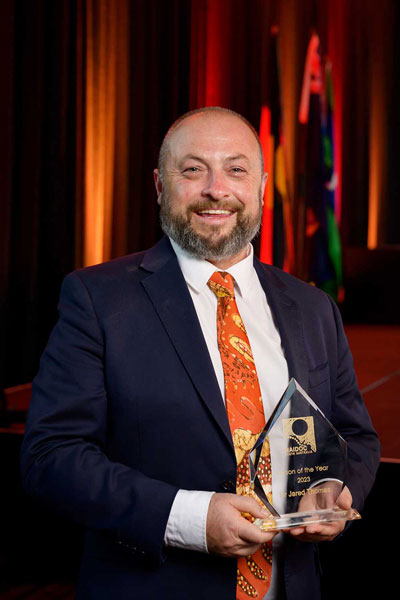 Dr Jared Thomas is the SA NAIDOC Person of the Year 2023.
Dr Jared Thomas is the SA NAIDOC Person of the Year 2023.UniSA Research Fellow and award-winning children’s and young adult fiction author Dr Jared Thomas has been named the South Australian NAIDOC Person of the Year 2023.
Presented by SA Premier Peter Malinauskas, the 2023 Premier’s NAIDOC Awards celebrate the achievements of Aboriginal South Australians who have made extraordinary differences to people’s lives.
Dr Thomas, a Nukunu man from the Southern Flinders Ranges, says the recognition is a huge honour.
“Especially as I'm aware of the incredible work that people in my own Nukunu community, and other Aboriginal people around the state are doing to strengthen our country and communities,” he says.
“As a researcher and author, often my work isn't as visible as other artforms such as the visual and performing arts.
“I'm pleased that the award will help to provide exposure of my various young adult and children's books, documentaries and research projects such as exhibitions through SA institutions such as the Museum of South Australia, MOD. and Samstag Museum of Art.”
Dr Thomas has produced international award-winning and young adult fiction titles including Calypso Summer, Songs that Sound like Blood and the Game Day series co-authored with NBA and Olympian basketballer Patty Mills.
This year his 2022 release My Spare Heart, published by Allen and Unwin, was shortlisted in the Victorian Premier’s Literary Awards for Best Young Adult Fiction and the Griffith University Best Young Adult Book Award as part of the State Library of Queensland Literary Awards, with the winners to be announced on 6 September.
In March this year, Dr Thomas released the first in his six-book series Uncle Xbox. In June, the series’ second instalment Getting Dusty, won the Daisy Utemorrah Award for Children's Fiction as part of the Western Australian Premier's Book Awards.
Digital Futures Initiative grant for gaming, music scholars
UniSA gaming and music researchers have won a $20,000 grant to explore the potential for automation of music in video games.
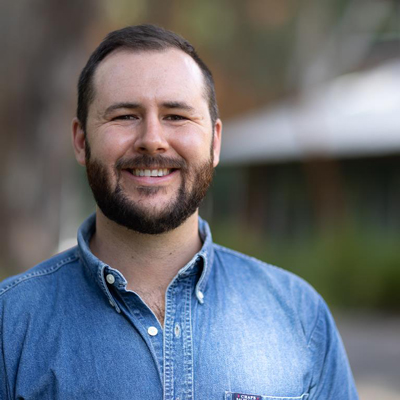 UniSA music scholar Dr Sam Whiting
UniSA music scholar Dr Sam WhitingThe research team, led by UniSA music scholar Dr Sam Whiting, includes gaming lecturer Dr Susannah Emery and lecturer John Oestmann, composer for the Adelaide-developed indie game Rooftop Renegade.
The Digital Futures Initiative grant was provided in partnership by music rights management organisation APRA AMCOS and the Australia Council for the Arts.
Dr Whiting says the new frontiers in automation and generative AI have the potential to make significant contributions in empowering composers and musicians – but “the question is how?”.
“While much of the current discussion has been on generative AI in design and text-based communication, musical automation contains a huge amount of potential, with most of the R&D in this area having been developed by the film industry,” he says.
“Musical automation in games, however, could make a significant contribution in empowering composers and musicians.”
The project will produce a video game in which all audio is generated live, from scratch, by a human-designed digital synthesis system. This audio will then change and adapt based on the actions of the person playing the game.
The game will be developed using Unreal Engine’s MetaSounds tool, which was created by UniSA academic partner Epic Games.
“The design framework, developments and critical reflections will be shared freely to empower other composers who are excited to create in this unfolding space, and contemporary industry research will provide important context for the creative project,” Dr Whiting says.
"One of our biggest goals with this project is to develop knowledge to freely empower other music-makers keen to explore this unfolding space.
“Being able to do this alongside the creation of our own game that will road test and demonstrate this new technology, means that our research will have a tangible impact with real-world outcomes.”
PhD researcher scores international film festival awards for onscreen works
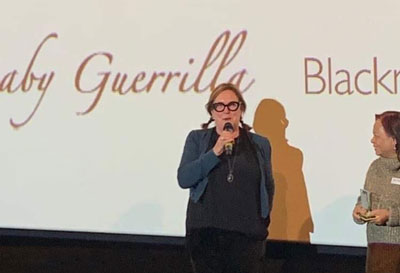 UniSA PhD student Nicola Tyndale-Biscoe on stage at the Setting Sun International Film Festival accepting one of the awards.
UniSA PhD student Nicola Tyndale-Biscoe on stage at the Setting Sun International Film Festival accepting one of the awards.UniSA PhD researcher Nicola Tyndale-Biscoe nabbed three major awards at the Setting Sun International Film Festival in Melbourne.
Tyndale-Biscoe, who is an award-winning writer and director of both documentary and drama, won the accolades for her short film, The Soft Skinned.
The annual Setting Sun International Film Festival presents high quality films from independent filmmakers in Australia and around the world.
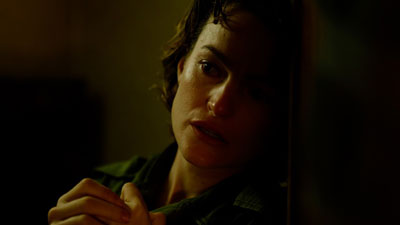 Hannah Monson as Lance Corporal Kath Davison in The Soft Skinned.
Hannah Monson as Lance Corporal Kath Davison in The Soft Skinned.The Soft Skinned was awarded Best Australia Drama and the Audience Choice Award for Best Film.
Hannah Monson, who delivers a well-regarded performance as Corporal Kath Davison in the film, won Best Actor.
The short film tells the story of Davison who, seven years on from deployment, must face the ghosts of Afghanistan when an exhausted, young asylum seeker turn up on her parent’s doorstep.
Tyndale-Biscoe has directed several short dramas and her work has been broadcast on SBS, ABC and screened at local and international film festivals.
She is pursuing a PhD at UniSA looking into collaborative story-making with survivors of war.
ARC grant for research into Aboriginal plant extracts
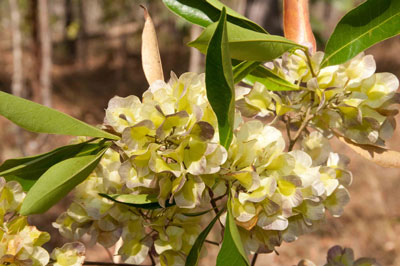 The Uncha plant. Photo: Chuulangun Aboriginal Corporation
The Uncha plant. Photo: Chuulangun Aboriginal CorporationUniSA researchers have been awarded a $380,000 funding boost from the Australian Research Council’s Linkage Program to explore the potential of using an ancient Aboriginal plant to produce skin care products.
Drs Susan Semple, Permal Deo and Bradley Simpson will collaborate with the Chuulangun Aboriginal Corporation and Byron Bay-based skincare company Melio Skincare to understand the processes needed for Aboriginal-led product development from the traditionally used Uncha plant (Dodonaea polyandra).
The Kuuku I’yu people of Cape York Peninsula in northern Queensland have long used the leaves and stems of the Uncha plant on toothaches and to soothe discomfort and inflammation.
Dr Semple and the research team will explore the potential of using this ancient inflammatory plant to produce skin care products based on shared Aboriginal knowledges and sustainable economic development.
The team will explore how to harvest, process and transport the plant materials from the remote homelands ethically and sustainably.
Dr Semple has been working with the Chuulangun Aboriginal Corporation over the past 20 years.
She says there are few examples of successful commercial development of high value products manufactured from Australian plant extracts that are based on shared Aboriginal knowledge and Western scientific evidence and developed in a way that is led by and of benefit to the Traditional Custodians.
“We are aiming to secure an acceptable way of supplying the plant from Country in a sustainable and culturally appropriate manner – this is crucial for future commercial development to occur,” Dr Semple says.
Students and alumni recognised at SA Media Awards
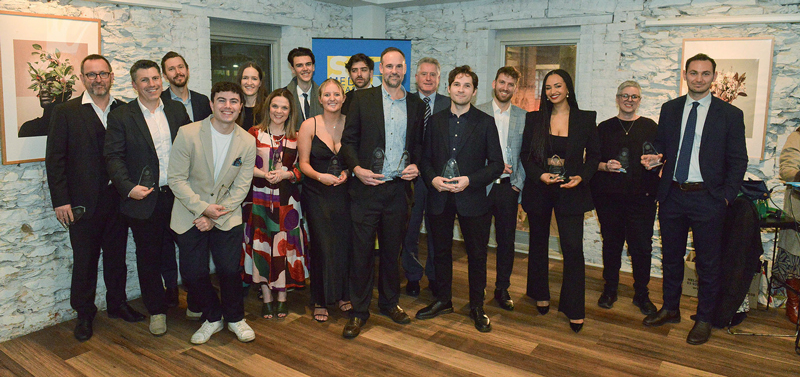
The SA Media Award winners for 2023.
An array of UniSA students and graduates have been recognised for their excellence, independence, innovation and originality at the 2023 SA Media Awards.
Journalists from various outlets across South Australia were commended for their thorough research and investigations, resulting in news breaking stories or features or engaging and entertaining reports.
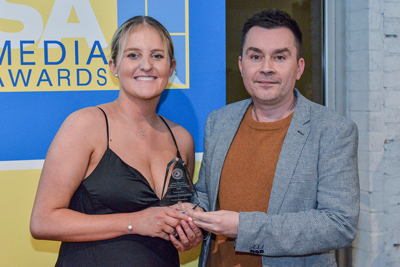 Winner of the Julie Duncan Memorial Award for Student Journalism Jessica Dempster with UniSA Creative Executive Dean Professor Craig Batty.
Winner of the Julie Duncan Memorial Award for Student Journalism Jessica Dempster with UniSA Creative Executive Dean Professor Craig Batty.UniSA Journalism and Creative Writing student Jessica Dempster was presented the Julie Duncan Memorial Award for Student Journalism following a strong portfolio of published works.
Dempster, who is in her final year at UniSA, contributes to the University’s student journalism outlet On The Record and Unicast radio where she hosts and produces a radio program.
She says she spent the past 12 months preparing a portfolio of work and building her experience after being inspired by her good friend and UniSA graduate Sarah Herrmann, who won the Julie Duncan Memorial Award in 2022.
“I was there watching Sarah get it and I knew I’d like to win the award too, so I set my sights on it and spent the last year working towards it,” Dempster says.
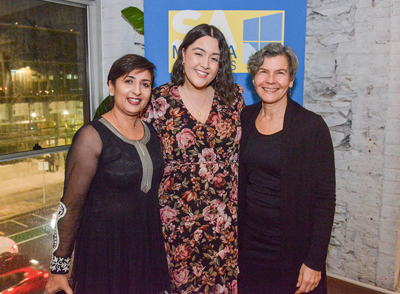 UniSA lecturer Neelu Sharma, left, UniSA journalism student Amelia Walters and Journalism and Professional Writing Program Director Dr Bonita Mason.
UniSA lecturer Neelu Sharma, left, UniSA journalism student Amelia Walters and Journalism and Professional Writing Program Director Dr Bonita Mason.“It was so good to have that hard work pay off and know that I had met that goal.”
Journalism and Communications student Amelia Walters was highly commended by the judges following her commitment to writing stories about things that matter – including sexual harassment in the hospitality industry and keeping community television on local screens.
Other UniSA-connected award winners include nine alumni:
- Max Fatchen Award for Best Young Journalist: Thomas Kelsall (Solstice Media/InDaily, “InDaily reporting 2022”)
- Business, Economics or Finance Report: Royce Kurmelovs (BBC/The Guardian, “Gone Ballistic”)
- Multimedia News or Feature: Nicholas Maher (ABC’s Behind the News, “Woman, Life, Freedom: Iran”)
- Commentary, Analysis, Opinion and Critique: Rory McClaren (ABC News, “Body of work”)
- Social Equity Report: Michael McGuire (The Advertiser, “Ice epidemic”)
- Television/Video Journalism: Amelia Moseley (ABC’s Behind the News, “Journey from Ukraine”
- Visual Storytelling: Lincoln Rothall (ABC, “War in Ukraine”)
- News: Riley Walter (The Advertiser, “Body of work”)
- Sports Report: Liz Walsh (The Advertiser, “Women’s football”).
Match Tournament winners tackle loneliness with the colour ‘Yello’
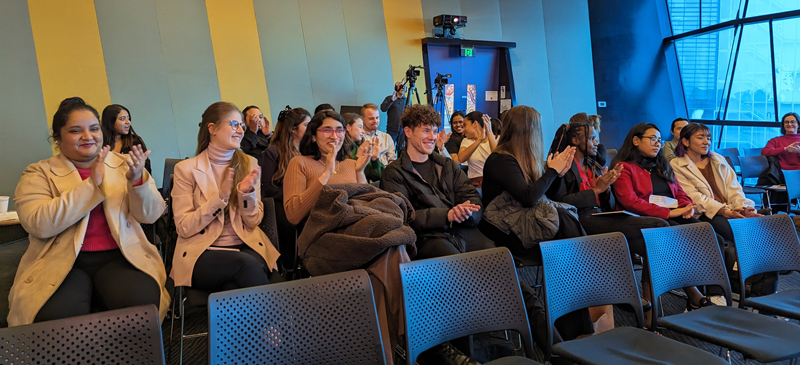
Match Studio’s 2023 Match Tournament was held in July.
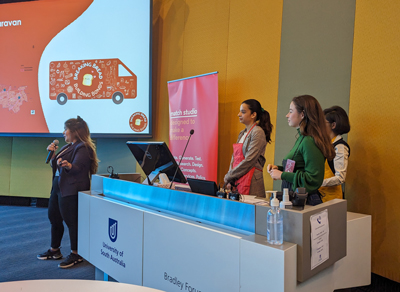 Team CIA presenting their campaign that aims to bring older people together to share food experiences.
Team CIA presenting their campaign that aims to bring older people together to share food experiences.Students from across the University gathered to pitch their best ideas and concepts for how to tackle loneliness in older people as part of Match Studio’s 2023 Match Tournament.
Hosted and delivered by UniSA’s Match Studio, the tournament saw interdisciplinary teams of students pitch their innovative proposals to a panel of judges from Wellbeing SA, the Office for Ageing Well, the City of Port Adelaide Enfield and Match Studio interim director Professor Ian Gwilt.
The winning team was Team Yello which took home the Best Proposal Award for their pitch titled ‘Yello’.
The Yello campaign entices people’s curiosity through the installation of yellow art pieces and spaces in the community, encouraging conversation among older citizens. The proposal also included the development of a monthly Yello flyer promoting local events that bring older people together.
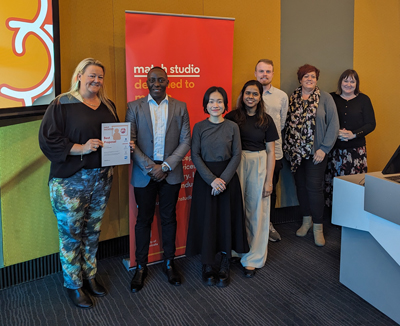 (L-R) Jo Williams (Wellbeing SA) with students Benjamin Opiyo, Quynh Anh Duong, Tom Malycha, Akhila Beena Asokan, Jan Angelo (City of Port Adelaide Enfield) and Leanne Davis-King (City of Port Adelaide Enfield).
(L-R) Jo Williams (Wellbeing SA) with students Benjamin Opiyo, Quynh Anh Duong, Tom Malycha, Akhila Beena Asokan, Jan Angelo (City of Port Adelaide Enfield) and Leanne Davis-King (City of Port Adelaide Enfield).Benjamin Altieri from Match Studio says the winning team will be awarded a considerable amount of space to showcase their proposal in an upcoming Match Studio exhibition later this year.
The industry partners are also free to assess the potential of using some or all of the Yello campaign in the community.
The Match Tournament is part of a three-week interdisciplinary design sprint, which began with the industry partners presenting the issue to be solved to students from various disciplines including communication, architecture and design.
The Match Tournament is one of Match Studio’s biggest initiatives, developed to enable more students from across UniSA the opportunity to engage in impactful, project-based learning.
“Within the tournament, students collaborate with academics, researchers, industry partners and our challenge proponents to develop creative catalysts that respond to a socially driven meta challenge,” says Altieri.
Students work together to learn and apply design thinking, systems thinking and collaborative tools and techniques to develop proposals that can make a different to people’s lives.
The project will conclude with an exhibition of all students’ work in the Kerry Packer Civic Gallery in the Hawke Building, City West, in October, coinciding with Mental Health Week (8 to 16 October) and World Mental Health Day (10 October).
ANNOUNCEMENTS
UniSA plays key role in collaboration in space research, iLAuNCH
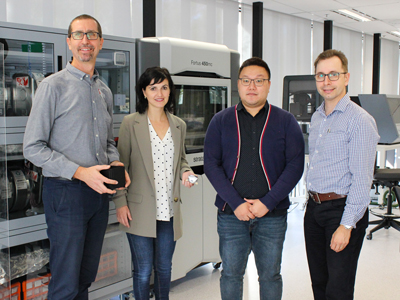 Professor Colin Hall, Dr Marta Llusca Jane, Dr Jebum Choi and Dr Kamil Zuber from UniSA’s Future Industries Institute are part of the new Innovative Launch, Automation, Novel Materials, Communications and Hypersonics (iLAuNCH) Trailblazer.
Professor Colin Hall, Dr Marta Llusca Jane, Dr Jebum Choi and Dr Kamil Zuber from UniSA’s Future Industries Institute are part of the new Innovative Launch, Automation, Novel Materials, Communications and Hypersonics (iLAuNCH) Trailblazer.UniSA researchers will play a key role in a new collaboration to boost Australia’s position in the global space economy, drive innovation and develop a new generation of space leaders.
This is the mission for the Innovative Launch, Automation, Novel Materials, Communications and Hypersonics (iLAuNCH) Trailblazer. It’s a partnership involving UniSA, the University of Southern Queensland (UniSQ), Australian National University and industry.
Assistant Minister for Education Senator Anthony Chisholm says iLAuNCH will harness Australia’s natural and competitive strengths to diversify and transform Australia’s economy, workforce and industry, while creating more sustainable, high-value jobs for all Australians.
“Industry plays a pivotal role in propelling university innovation to the forefront of Australia’s economic recovery, and there is great opportunity for small and medium enterprises, as well as the large organisation, to collaborate with Australia’s outstanding researchers,” he says.
iLAuNCH is among the largest space research hubs in Australia. Formed last year through the Federal Government Trailblazer Universities Program, iLAuNCH features more than 20 industry partners.
The $180 million program will invest in space industry research, commercialisation and manufacturing over four years.
The goal is to deliver billions in economic benefits by 2040 and create a lasting legacy for Australia’s space industry.
UniSA Future Industries Institute Professor Colin Hall says the University is proud to be part of the iLAuNCH consortium.
“This unique initiative represents a real opportunity for Australia to expand and develop our space engineering ecosystem,” Prof Hall says.
Over the next three and a half years, the UniSA team will work with six industry partners across three key projects with a total value of around $20m.
“Through collaboration and innovation, we will demonstrate how space capable technologies can inspire the next generation of space engineers and realise a commercial outcome in this sector,” he says.
The Trailblazer Universities Program includes the opportunity for participating universities to partner with Australia’s national science agency, CSIRO, to access specialist equipment and expertise to support the delivery of their projects.
New future university microsite launched
A new microsite has been launched to provide a go-to place for the latest information about UniSA’s transition to Adelaide University – a potential future university for South Australia.
The website replaces the previous futureuni landing page under the new domain – adelaideuni.edu.au – as UniSA moves through this next phase of detailed transition planning and implementation with the University of Adelaide.
It includes an overview of the potential future university, proposed implementation timelines, messages from both universities’ Chancellors and Vice Chancellors, key documentation and FAQs.
The site will be regularly updated and will also become a platform for promoting opportunities to become involved in co-creation. There’s also a new enquiry form where the two university communities can continue to ask questions or provide feedback.
2023 Images of Research and Teaching competition People’s Choice winner announced
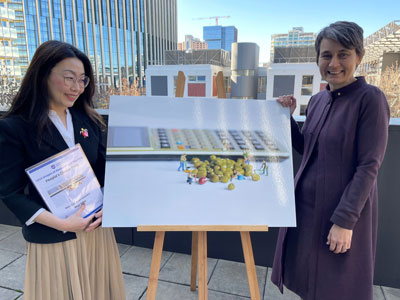 UniSA senior lecturer in accounting Dr Mei Lim and UniSA Deputy Vice Chancellor: Research and Enterprise Professor Marnie Hughes-Warrington AO. Dr Lim’s image, Next Gen Bean Counters, won the People’s Choice category of the 2023 Images of Researching and Teaching competition.
UniSA senior lecturer in accounting Dr Mei Lim and UniSA Deputy Vice Chancellor: Research and Enterprise Professor Marnie Hughes-Warrington AO. Dr Lim’s image, Next Gen Bean Counters, won the People’s Choice category of the 2023 Images of Researching and Teaching competition.A photograph by UniSA senior lecturer in accounting Dr Mei Lim has won the People’s Choice category of the 2023 Images of Researching and Teaching competition.
Dr Lim, who also won the second prize in the Teaching Category, was voted the People’s Choice winner for her image, titled Next Gen Bean Counters.
"Students count beans to achieve bigger goals. Dreams are constructed thanks to the culmination of many little insignificant steps, which, when combined, can lead to something much larger … ultimately employability and successful careers," she says.
UniSA Deputy Vice Chancellor: Research and Enterprise Professor Marnie Hughes-Warrington AO congratulated Dr Lim on her achievement, which was the culmination of a record number of votes in the People’s Choice category.
“Thank you to everyone who entered the competition this year … the images and videos submitted across both categories were outstanding and showcase the quality of our enterprise,” Prof Hughes-Warrington says.
APPOINTMENTS
University appoints inaugural Chair in Regional Housing and Planning amid national housing crisis
Amid Australia’s housing crisis that is contributing to significant levels of housing stress particularly among low-income earners, UniSA has appointed its first Chair in Regional Housing and Planning.
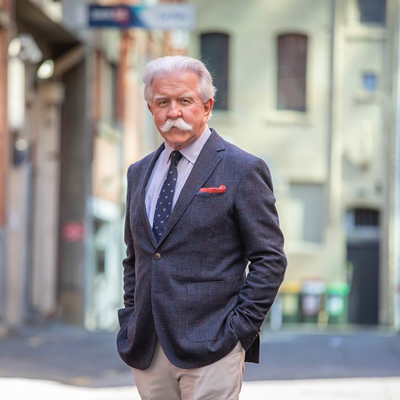 Professor Michael Lennon
Professor Michael LennonFormer managing director of Housing Choices Australia, Professor Michael Lennon, has been a leading figure in housing and planning and joins UniSA with 30 years of experience in senior roles in executive management, governance and policy development.
Prof Lennon, who is also the Deputy Chair of the Federal Government’s Interim National Housing Supply and Affordability Council, has provided high-level counsel to governments across all tiers, regularly leading or providing input to a wide range of inquiries and advisory bodies.
His expertise comes at a time when millions of families are experiencing mortgage stress, spiralling household expenses and a diminishing supply of vacant rental properties.
“Australia has a long-term structural challenge with housing costs and affordability. During and post pandemic this has worsened,” Prof Lennon says.
“Home ownership rates have been falling for more than a decade, fastest among young to middle-aged cohorts. Social housing has been static or in decline. Almost a third of Australians now call the private rental market home, with rental costs escalating way beyond inflation.”
UniSA Business Executive Dean Professor Andrew Beer congratulated Prof Lennon on his appointment as the Chair in Regional Housing and welcomed him to UniSA.
“This is a difficult time for so many everyday Australians affected by consecutive interest rate hikes and a crippling shortage of affordable housing, particularly in regional areas of our state where vacancy rates are at a low and rent prices have surged,” Prof Beer says.
“Prof Lennon will provide expertise and informed commentary on regional housing affordability in South Australia and his appointment will be an asset for government, the media and South Australians as a whole.”
Professor Lennon’s appointment builds upon a distinguished career working in government and the private and not-for-profit sectors. He is an internationally experienced CEO and has advised governments at all levels, including as Chair of the South Australian Planning Commission, overseeing the state’s new planning system.
Read more in the media release, announcing Prof Lennon’s appointment.
Other Stories
- Out with the life coach, in with the chatbot: How AI can support an A1 lifestyle
- Workplace discrimination is rife for pregnant women and working parents
- ‘I feel like I’m suffocating’: what’s driving suicidal thoughts in the Australian construction industry?
- What is dandruff? How do I get rid of it? Why does it keep coming back?
- From the Vice Chancellor: Why we’re in a prime position for the future
- Achievements and Announcements
- Home-grown talent at Rising Sun Pictures
- Pets provide a voice for people with acquired language difficulties
- In Pictures: International Student Welcome Reception
- The latest books from UniSA researchers




